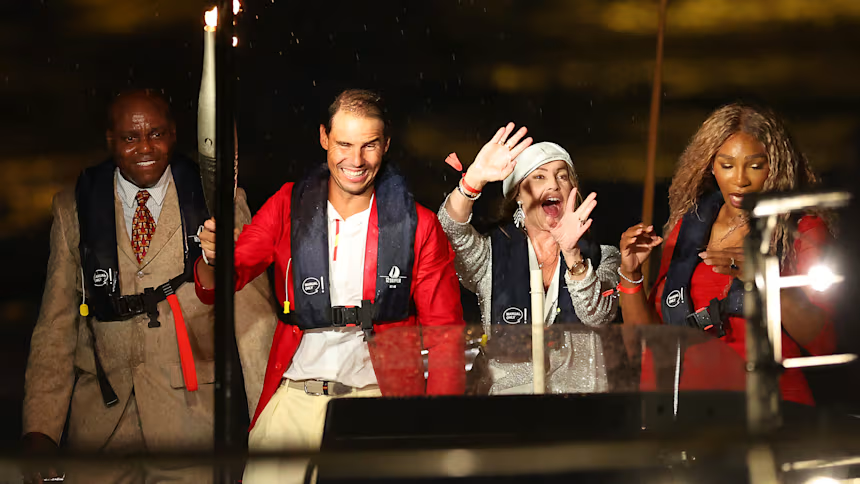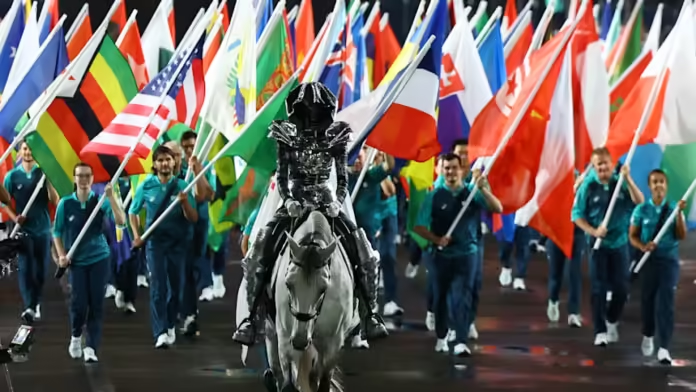Paris, a city renowned for its historical significance, added another unforgettable chapter to its narrative with the opening ceremony of the Paris 2024 Olympic Games. The unprecedented spectacle of 85 boats carrying 6,800 athletes along the Seine, culminating in the ascent of the Olympic flame on a hot air balloon, transformed the City of Lights into an ethereal stage.
Paris Olympics 2024 Opening Ceremony: A People’s Ceremony
On Friday, July 26, 2024, the City of Lights transformed into a vast sports stadium. Breaking from tradition, the ceremony embraced a more inclusive approach. Instead of a traditional stadium setting, the Seine became the heart of the event, inviting the public to be part of the action. The riverbanks transformed into grandstands, while iconic Parisian landmarks served as a stunning backdrop. Spectators, athletes, and Parisians alike were immersed in a four-hour extravaganza that celebrated diversity and unity.
Paris Olympics 2024 Opening Ceremony: A Symphony of Art and Sport
The ceremony seamlessly blended art and sport, creating a captivating experience. From mesmerizing performances by renowned artists to the vibrant energy of the athlete parade, the event showcased the best of French culture. The integration of historical landmarks into the narrative added depth and richness to the spectacle.
Paris Olympics 2024 Opening Ceremony: A Call to Unity
The culmination of the ceremony witnessed the official opening of the Paris Olympic Games by French President Emmanuel Macron. In a powerful address, IOC President Thomas Bach emphasized the unifying power of sport and invited the world to dream with the Olympic athletes. The lighting of the Olympic cauldron, carried aloft by a hot air balloon, marked the beginning of a historic sporting event.
Paris Olympics 2024 Opening Ceremony: 6 Kilometers, 85 Boats
A Glittering Opening Act
The Paris 2024 opening ceremony commenced with a dazzling performance by global superstar Lady Gaga. Her electrifying rendition of the iconic French cabaret song, “Mon truc en plume,” immediately captured the world’s attention and set the stage for an extraordinary evening. Gaga’s performance was more than just entertainment; it was a powerful statement, signaling the beginning of a unique and unforgettable celebration.
A Floating Parade of Nations
The subsequent Parade of Nations was a truly innovative and visually striking spectacle. Instead of the traditional march through a stadium, 6,800 athletes from 205 nations embarked on a journey along the Seine River. The 85-boat flotilla traversed six kilometers, passing iconic Parisian landmarks such as the Esplanade des Invalides, Place de la Concorde, and Notre Dame. This unconventional approach transformed the river into a dynamic stage, offering a breathtaking backdrop for the world’s athletes.
The inclusion of several Olympic competition venues along the parade route was a clever touch, creating a seamless transition from the celebratory atmosphere to the competitive spirit of the Games. By showcasing these venues, the organizers effectively built anticipation for the sporting events to come.
FLAGBEARERS AT PARIS 2024 OLYMPICS OPENING CEREMONY
| Nation | Female Flagbearer | Male Flagbearer |
| Algeria | Amina Belhadi (Judo) | Yasser Triki (Athletics) |
| Australia | Jessica Fox (Canoe Slalom) | Eddie Ockenden (Hockey) |
| Austria | Michaela Polleres (Judo) | Felix Oschmautz (Canoe Slalom) |
| Bahamas | Devynne Charlton (Athletics) | Steven Gardiner (Athletics) |
| Belgium | Emma Meesseman (Basketball) | Jérôme Guéry (Equestrian) |
| Brazil | Raquel Kochhann (Rugby sevens) | Isaquias Queiroz (Canoeing) |
| Canada | Maude Charron (Weightlifting) | Andre De Grasse (Athletics) |
| Chile | Antonia Abraham (Rowing) | Nicolás Jarry (Tennis) |
| Colombia | Flor Ruiz (Athletics) | Kevin Quintero (Cycling) |
| Cuba | Idalys Ortiz (Judo) | Mijaín López (Wrestling) |
| Denmark | Anne-Marie Rindom (Sailing) | Niklas Landin Jacobsen (Handball) |
| Egypt | Sara Ahmed (Weightlifting) | Ahmed El-Gendy (Modern pentathlon) |
| Finland | Sinem Kurtbay (Sailing) | Eetu Kallioinen (Shooting) |
| France | Mélina Robert-Michon (Athletics) | Florent Manaudou (Swimming) |
| Germany | Anna-Maria Wagner (Judo) | Dennis Schröder (Basketball) |
| Great Britain | Helen Glover (Rowing) | Tom Daley (Diving) |
| Greece | Antigoni Drisbioti (Athletics) | Giannis Antetokounmpo (Basketball) |
| India | P. V. Sindhu (Badminton) | Sharath Kamal (Table tennis) |
| Indonesia | Maryam March Maharani (Judo) | – |
| Ireland | TBC | TBC |
| Italy | Arianna Errigo (Fencing) | Gianmarco Tamberi (Athletics) |
| Jamaica | Shanieka Ricketts (Athletics) | Josh Kirlew (Swimming) |
| Japan | Misaki Emura (Fencing) | Shigeyuki Nakarai (Breaking) |
| Kenya | Trizah Atuka (Volleyball) | Ferdinand Omanyala (Athletics) |
| Malaysia | Nur Shazrin Mohd Latif (Sailing) | Bertrand Rhodict Lises (Diving) |
| Mexico | Alejandra Orozco (Diving) | Emiliano Hernández (Modern pentathlon) |
| Morocco | Ines Laklalech (Golf) | Yessin Rahmouni (Equestrian) |
| Netherlands | Lois Abbingh (Handball) | Worthy de Jong (3×3 Basketball) |
| New Zealand | Jo Aleh (Sailing) | Aaron Gate (Cycling) |
| Nigeria | Tobi Amusan (Athletics) | – |
| Norway | Katrine Lunde (Handball) | Christian Sørum (Volleyball) |
| Pakistan | Jehanara Nabi (Swimming) | Arshad Nadeem (Athletics) |
| People’s Republic of China | Feng Yu (Synchronised swimming) | Ma Long (Table tennis) |
| Philippines | Nesthy Petecio (Boxing) | Carlo Paalam (Boxing) |
| Poland | Anita Włodarczyk (Athletics) | Przemysław Zamojski (3×3 Basketball) |
| Portugal | Ana Cabecinha (Athletics) | Fernando Pimenta (Canoeing) |
| Refugee Olympic Team | Cindy Ngamba (Boxing) | Yahya Al Ghotany (Taekwondo) |
| Republic of Korea | Kim Seo-yeong (Swimming) | Woo Sang-hyeok (Athletics) |
| Romania | Ionela Cozmiuc (Rowing) | Marius Cozmiuc (Rowing) |
| Singapore | Shanti Pereira (Athletics) | Ryan Lo (Sailing) |
| South Africa | Caitlin Rooskrantz (Gymnastics) | Akani Simbine (Athletics) |
| Spain | Támara Echegoyen (Sailing) | Marcus Cooper Walz (Canoeing) |
| Sri Lanka | Dilhani Lekamge (Athletics) | Viren Nettasinghe (Badminton) |
| Sweden | Josefin Olsson (Sailing) | Peder Fredricson (Equestrian) |
| Switzerland | Nina Christen (Shooting) | Nino Schurter (Cycling Mountain Bike) |
| Thailand | Vareeraya Sukasem (Skateboarding) | Puripol Boonson (Athletics) |
| United States | Coco Gauff (Tennis) | LeBron James (Basketball) |
A Symphony of Unity
The Parade of Nations was more than just a visual display; it was a powerful symbol of unity and global cooperation. Athletes from diverse cultures and backgrounds shared boats, fostering a sense of camaraderie and mutual respect. The image of athletes from countries with vastly different histories and traditions coming together on a single vessel was a poignant reminder of the Olympic ideal.
The participation of surfers from Tahiti, who joined the festivities via video link, added a touch of global flair and showcased the Olympics’ ability to reach a worldwide audience. Their inclusion also highlighted the Games’ commitment to embracing a wide range of sports and cultures.
A Warm Welcome to Paris
Tony Estanguet’s heartfelt welcome to the athletes underscored the importance of their participation in the Paris 2024 Olympics. By acknowledging their dedication and sacrifices, he created a sense of connection between the athletes and the host city. Estanguet’s speech not only welcomed the athletes but also inspired them to excel in the upcoming competitions.
The overall effect of the opening ceremony was to create a memorable and inclusive experience that captured the spirit of the Olympic Games. By blending art, culture, and sports, Paris 2024 delivered a truly unforgettable event.
Paris Olympics 2024 Opening Ceremony: Cinematic Spectacle on the Seine, A Living Stage on the River
The Seine River was transformed into a dynamic, open-air theater for the Paris 2024 opening ceremony. This innovative approach allowed for a truly immersive experience, as spectators were enveloped by the spectacle on all sides. Twelve meticulously crafted artistic tableaux brought iconic Parisian landmarks to life, creating a visually stunning and historically rich tapestry. From the dramatic reenactments of historical events to contemporary artistic expressions, the performance was a feast for the senses.
A Fusion of Art and History
The Louvre-inspired segment was a masterful blend of art and storytelling. The illusion of iconic masterpieces rising from the river’s depths was a breathtaking visual effect that paid homage to the museum’s global significance. The parallel narrative of a masked torchbearer’s journey through the Louvre added a layer of intrigue and mystery, captivating the audience and drawing them deeper into the performance. This innovative approach demonstrated the power of storytelling through visual spectacle.
Paris Olympics 2024 Opening Ceremony: A Celebration of French Culture and Values
The opening ceremony was a love letter to France, showcasing the country’s rich cultural heritage. By seamlessly integrating elements of both high and popular culture, the performance appealed to a wide audience. The inclusion of traditional symbols like berets and croissants added a touch of whimsy, while the grandeur of opera and ballet showcased France’s artistic sophistication.
The ceremony also made a powerful statement about gender equality. The juxtaposition of traditionally male-dominated spaces, such as the National Assembly, with statues of influential women was a bold and timely message. This visual representation aligned with the Paris 2024 Olympics’ commitment to gender parity, demonstrating the Games’ role as a platform for social progress.
By combining historical storytelling, artistic innovation, and cultural celebration, the opening ceremony created a truly unforgettable experience for viewers around the world.
Paris Olympics 2024 Opening Ceremony: A Celebration for the World
The Paris 2024 opening ceremony seamlessly transitioned from a solemn and reflective tone to a vibrant and exuberant celebration. A striking fashion show, creatively staged on a banquet table, injected a playful and unexpected element into the proceedings. Despite the inclement weather, the energy and enthusiasm of both the athletes and spectators remained undiminished.
The contrast between the Paris 2024 ceremony and the Tokyo 2020 Olympics was stark. While the latter was constrained by the global pandemic, Paris offered a joyous and inclusive spectacle. The presence of a live audience of approximately 320,000 people along the Seine, coupled with the millions watching worldwide, created an electric atmosphere. The French team, led by seven-time Olympian Melina Robert-Michon, embodied the nation’s hopes and aspirations. Robert-Michon’s sentiments captured the spirit of the event, highlighting its potential to inspire the French people and create lasting memories.
The ceremony’s historical perspective, showcased through images of the past century of sports, added depth and significance to the occasion. This visual journey emphasized the progress made in sports and humanity, underscoring the Olympic movement’s role in fostering global unity and cooperation.
Paris Olympics 2024 Opening Ceremony: A Century of Progress and a Symbolic Handoff
The Paris 2024 opening ceremony masterfully blended contemporary spectacle with historical reflection. A poignant visual journey through a century of sports history unfolded on large screens across the city, highlighting the remarkable progress made since Paris last hosted the Olympics in 1924. This historical perspective underscored the enduring spirit of the Olympic movement and its role in shaping the modern world.
The symbolic entry of the Olympic flag was a captivating moment. A horsewoman, clad in a futuristic silver suit, carried the flag as if riding a phantom steed, creating a surreal and visually striking image. This ethereal procession along the Seine culminated at the Trocadero, where the transition from the symbolic to the tangible occurred. Floriane Issert, a non-commissioned officer of the National Gendarmerie, took over, riding a live horse and carrying the Olympic flag to the heart of the ceremony. This physical embodiment of the flag marked the official start of the protocol section, a powerful and visually impactful moment that bridged the past, present, and future of the Olympic Games.
The subsequent entry of the national flags, carried by a group of dedicated Games volunteers, signified the unity and diversity of the global sporting community. This final element of the opening ceremony set the stage for the competitive spirit and camaraderie that would define the Games.
Paris Olympics 2024 Opening Ceremony: A Torch Relay Extraordinaire
The journey of the Olympic flame was as much a spectacle as the athlete parade. Beginning its Parisian odyssey in the unlikely setting of the metro, carried by the iconic figure of Zinedine Zidane, the flame embarked on a thrilling adventure. It traversed the city’s rooftops, navigated the hallowed halls of the Louvre, and returned to the World Cup champion, creating a sense of anticipation and excitement.
The passing of the flame from Zidane to Rafael Nadal, a tennis legend with a profound connection to France, added another layer of star power to the event. The subsequent journey by boat, carrying a constellation of Olympic greatness, including Serena Williams, Carl Lewis, and Nadia Comaneci, transformed the Seine into a floating hall of fame. This unique relay showcased the global reach and impact of the Olympic movement.

As the flame made its final approach to the Jardin des Tuileries, accompanied by a cohort of Olympic and Paralympic heroes, the anticipation for the cauldron lighting reached its zenith. The stage was set for a grand finale that would cap off a truly extraordinary evening.
Paris Olympics 2024 Opening Ceremony: A Dazzling Grand Finale
French sporting icons Teddy Riner and Marie-José Pérec were entrusted with the final leg of the torch relay. They carried the Olympic flame towards a unique cauldron – a ring of fire suspended from a hot air balloon. This innovative design paid homage to the world’s first hydrogen-powered balloon flight, which took place at the same location in 1783.
As the flame ignited the cauldron, the balloon ascended into the night sky, creating a breathtaking spectacle. To add to the magic, Celine Dion made a surprise appearance on the Eiffel Tower balcony, performing a live rendition of “L’hymne à l’amour” for the first time since her public health battle. Her powerful vocals, coupled with the soaring Olympic flame, created an unforgettable moment in Parisian history.
The city erupted in cheers as this iconic image unfolded – a world-renowned singer on a global stage, the Olympic flame ascending into the heavens, and the Eiffel Tower as a majestic backdrop. It was a perfect culmination of a truly extraordinary evening.

